8th Chess Olympiad
The 8th Chess Olympiad, organised by the Fédération Internationale des Échecs (FIDE), comprised an 'open'[1] tournament, as well as a Women's World Championship contest. The main team event took place between August 21 and September 19, 1939, in the Politeama theatre in Buenos Aires, Argentina and coincided with the outbreak of World War II. The Olympiad is the subject of the book: Pawns in a Greater Game which was published in March 2015.
Following the end of the 8th Olympiad, the Chess Olympiad was suspended indefinitely due to economic concerns in conjunction with World War II; the next Chess Olympiad would not be held until 1950.
Background
There was a record number of entries, with twenty-seven teams taking part. This compared with the nineteen nations participating at the previous Olympiad; the substantial increase being mostly due to the interest shown by other Central and South American nations, including Cuba, led by former World Champion José Raúl Capablanca on the top board.
Due to certain political events, prominent Austrian players Erich Eliskases and Albert Becker were playing under the German flag and official sources referred to the Czechoslovak team as 'Bohemia & Moravia'. Two of the teams that did not compete were those that finished first and second at Stockholm, namely the United States and Hungary. Indeed, some nations found the cost of sending a team such a distance for a lengthy period prohibitively expensive.
Following the Preliminaries, the teams were split into Final Group A or Final Group B, with the former contesting the Hamilton-Russell Cup and the latter playing for the 'Copa Argentina', a consolation trophy presented by the Argentine President.
Preliminaries
The preliminaries were played from August 21–31, 1939. There were three groups of 7 teams and a group of 6. From a round-robin format, the top four in each group then went forward to Final A, the remainder to Final B. Group winners were Bohemia & Moravia (tied with Poland, Group 1), Latvia (Group 2), Argentina (Group 3) and Sweden (Group 4).
Finals
The finals commenced on September 1, the very date of the outbreak of World War II. This led to much confusion amongst the European teams, although most players wanted to continue. The England team, despite having qualified for Final A, were the only team to return home immediately and their place was not filled. Three of five English representatives: Conel Hugh O'Donel Alexander, Stuart Milner-Barry, and Harry Golombek were soon recruited into Bletchley Park, the British codebreaking centre during World War II.
Concerning the remaining delegations, a crisis assembly was called to vote on how to proceed; this comprised team captains, the hosts and organisers. Leading roles were reportedly taken by World Champion Alexander Alekhine (France), Savielly Tartakower (Poland), Albert Becker (Germany) and the president of the Argentine Chess Federation, Augusto de Muro. The verdict was to continue with the Olympiad.[2]
The political ramifications continued, however, when it became apparent that six of the scheduled finals matches could not be played due to tensions aroused by the war. After considerable deliberation and negotiation, a total of six matches (GER-POL, GER-FRA, GER-PAL, B&M-POL, B&M-FRA, and ARG-PAL) were declared drawn 2–2 by mutual forfeit and this allowed the remainder of the competition to be played out to a conclusion.[3]
Aftermath
At the conclusion of events, many participants decided to stay in Argentina or moved elsewhere in South America, rather than face an uncertain future by returning to a Europe in the midst of war. The players affected included Miguel Najdorf, Paulino Frydman, Gideon Ståhlberg, Erich Eliskases, Paul Michel, Ludwig Engels, Albert Becker, Heinrich Reinhardt, Jiří Pelikán, Karel Skalička, Markas Luckis, Movsas Feigins, Ilmar Raud, Moshe Czerniak, Meir Rauch, Victor Winz, Aristide Gromer, Franciszek Sulik, Adolf Seitz, Chris De Ronde, John Francis O'Donovan, Zelman Kleinstein, Sonja Graf and Paulette Schwartzmann.[4] Most of them were Jewish and had come to Buenos Aires in August 1939 on the Belgian steamer "Piriapolis".[5] The ship has therefore come to be regarded as the epitome of Noah's Ark for a generation of chess players.[6][7] Significantly, all five members of the German team (Eliskases, Michel, Engels, Becker, Reinhardt) also chose not to return to Nazi Germany.
Results
Final A
# Country Players Points 1 .svg.png.webp) Germany
GermanyEliskases, Michel, Engels, Becker, Reinhardt 36 2 .svg.png.webp) Poland
PolandTartakower, Najdorf, Frydman, Regedziński, Sulik 35½ 3  Estonia
EstoniaKeres, Raud, Schmidt, Friedemann, Türn 33½ 4  Sweden
SwedenStåhlberg, Lundin, Bergkvist, Danielsson, Ekenberg 33 5  Argentina
ArgentinaGrau, Piazzini, Bolbochán Jac., Guimard, Pleci 32½ 6 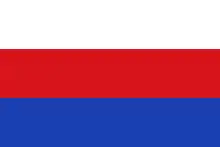 Protectorate of Bohemia and Moravia
Protectorate of Bohemia and MoraviaOpočenský, Foltys, Pelikán, Skalička, Zíta 32 7  Latvia
LatviaPetrovs, Apšenieks, Feigins, Endzelīns, Melngailis 31½ 8  Netherlands
Netherlandsvan Scheltinga, Cortlever, De Groot, Prins, De Ronde 30½ 9  Palestine
PalestineCzerniak, Foerder, Winz, Kleinstein, Rauch 26 10 .svg.png.webp) France
FranceAlekhine, Gromer, Kahn, Rometti, Dez 24½ 11 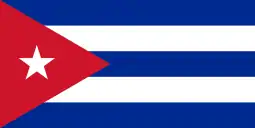 Cuba
CubaCapablanca, López, Alemán, Blanco, Planas 22½ 12  Chile
ChileCastillo, Flores, Letelier, Salas Romo, Reed 22 13 .svg.png.webp) Lithuania
LithuaniaMikėnas, Vaitonis, Luckis, Tautvaišas, Andrašiūnas 22 14 .svg.png.webp) Brazil
BrazilTrompowsky, Silva Rocha, Cruz W., Souza Mendes, Cruz Filho 21 15  Denmark
DenmarkEnevoldsen, Poulsen, Christensen, Sørensen, Larsen 17½ 16  England
EnglandAlexander, Thomas, Milner-Barry, Golombek, Wood -
Prizes for best individual performances (based on results in the final only) went to:
- Board 1:
 José Raúl Capablanca 8½ / 11 = 77.3%
José Raúl Capablanca 8½ / 11 = 77.3% - Board 2:
 Heinz Foerder (7½/10) and
Heinz Foerder (7½/10) and .svg.png.webp) Miguel Najdorf (9/12) = 75.0%
Miguel Najdorf (9/12) = 75.0% - Board 3:
.svg.png.webp) Ludwig Engels 9½ / 11 = 86.4%
Ludwig Engels 9½ / 11 = 86.4% - Board 4:
 Gunnar Friedemann 10 / 13 = 76.9%
Gunnar Friedemann 10 / 13 = 76.9% - Reserve:
.svg.png.webp) Isaias Pleci 9½ / 13 = 73.1%
Isaias Pleci 9½ / 13 = 73.1%
Final B
# Country Players Points 17  Iceland
IcelandMöller, Ásgeirsson, Guðmundsson, Thorvaldsson, Arnlaugsson 28 18 .svg.png.webp) Canada
CanadaMorrison, Yanofsky, Opsahl, Holowach, Helman 28 19  Norway
NorwayRojahn, Larsen, Rebnord, Austbø 27 20 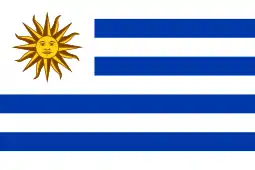 Uruguay
UruguayRotunno, Hounie Fleurquin, Gulla, Roux Cabral, Olivera 26 21  Bulgaria
BulgariaTsvetkov, Neikirch, Kiprov, Kantardzhiev, Karastoichev 25½ 22 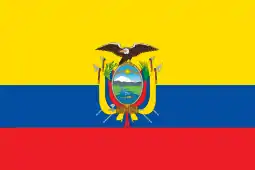 Ecuador
EcuadorPonce, Morales, Sierra, Suarez Dávila, Ayala 21 23 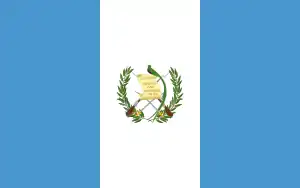 Guatemala
GuatemalaVassaux, Asturias, Cruz Bulnes, Salazar 15½ 24  Ireland
IrelandO'Hanlon, O'Donovan, Kerlin, Minnis, Nash 15½ 25 .svg.png.webp) Peru
PeruIsmodes, Pinzón Solis, Castro de Mendoza, Soto, Cayo 14 26 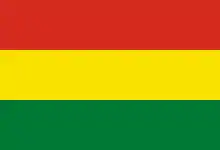 Bolivia
BoliviaCordova, Baender, Rodríguez Hurtado, Zavala, Reyes Velasco 10 27 .svg.png.webp) Paraguay
ParaguayDíaz Pérez, Espínola, Laterza, Boettner, Aponte 9½
Prizes for best individual performances (based on results in the final only) went to:
- Board 1:
 Ernst Rojahn
Ernst Rojahn - Board 2:
.svg.png.webp) Daniel Yanofsky
Daniel Yanofsky - Board 3:
.svg.png.webp) Jón Guðmundsson
Jón Guðmundsson - Board 4:
 Mikhail Kantardzhiev
Mikhail Kantardzhiev - Reserve:
.svg.png.webp) Guðmundur Arnlaugsson
Guðmundur Arnlaugsson
Team results
Group 1
| Place | Country | 1 | 2 | 3 | 4 | 5 | 6 | 7 | + | − | = | Points | |
|---|---|---|---|---|---|---|---|---|---|---|---|---|---|
| 1—2 | - | 2 | 3 | 3½ | 2½ | 4 | 3½ | 5 | 0 | 1 | 18½ | ||
| 1—2 | 2 | - | 2½ | 3½ | 3 | 4 | 3½ | 5 | 0 | 1 | 18½ | ||
| 3 | 1 | 1½ | - | 3 | 2½ | 2½ | 3 | 4 | 2 | 0 | 13½ | ||
| 4 | ½ | ½ | 1 | - | 3 | 3½ | 4 | 3 | 3 | 0 | 12½ | ||
| 5 | 1½ | 1 | 1½ | 1 | - | 3½ | 2½ | 2 | 4 | 0 | 11 | ||
| 6 | 0 | 0 | 1½ | ½ | ½ | - | 2½ | 1 | 5 | 0 | 5 | ||
| 7 | ½ | ½ | 1 | 0 | 1½ | 1½ | - | 0 | 6 | 0 | 5 |
Group 2
| Place | Country | 1 | 2 | 3 | 4 | 5 | 6 | 7 | + | − | = | Points | |
|---|---|---|---|---|---|---|---|---|---|---|---|---|---|
| 1 | - | 1½ | 3½ | 2½ | 3 | 3 | 4 | 5 | 1 | 0 | 17½ | ||
| 2 | 2½ | - | 2½ | 2 | 3 | 2½ | 3½ | 5 | 0 | 1 | 16 | ||
| 3 | ½ | 1½ | - | 2½ | 3 | 3 | 3½ | 4 | 2 | 0 | 14 | ||
| 4 | 1½ | 2 | 1½ | - | 2 | 3 | 3½ | 2 | 2 | 2 | 13½ | ||
| 5 | 1 | 1 | 1 | 2 | - | 3 | 2 | 1 | 3 | 2 | 10 | ||
| 6 | 1 | 1½ | 1 | 1 | 1 | - | 3 | 1 | 5 | 0 | 8½ | ||
| 7 | 0 | ½ | ½ | ½ | 2 | 1 | - | 0 | 5 | 1 | 4½ |
Group 3
| Place | Country | 1 | 2 | 3 | 4 | 5 | 6 | 7 | + | − | = | Points | |
|---|---|---|---|---|---|---|---|---|---|---|---|---|---|
| 1 | - | 2½ | 3 | 2½ | 2½ | 3½ | 4 | 6 | 0 | 0 | 18 | ||
| 2 | 1½ | - | 1½ | 3 | 2½ | 4 | 4 | 4 | 2 | 0 | 16½ | ||
| 3 | 1 | 2½ | - | 2 | 2½ | 3½ | 3½ | 4 | 1 | 1 | 15 | ||
| 4 | 1½ | 1 | 2 | - | 2 | 4 | 3 | 2 | 2 | 2 | 13½ | ||
| 5 | 1½ | 1½ | 1½ | 2 | - | 3½ | 3 | 2 | 3 | 1 | 13 | ||
| 6 | ½ | 0 | ½ | 0 | ½ | - | 3 | 1 | 5 | 0 | 4½ | ||
| 7 | 0 | 0 | ½ | 1 | 1 | 1 | - | 0 | 6 | 0 | 3½ |
Group 4
| Place | Country | 1 | 2 | 3 | 4 | 5 | 6 | + | − | = | Points | |
|---|---|---|---|---|---|---|---|---|---|---|---|---|
| 1 | - | 1 | 2½ | 2½ | 4 | 4 | 4 | 1 | 0 | 14 | ||
| 2 | 3 | - | 1½ | 2½ | 2 | 4 | 3 | 1 | 1 | 13 | ||
| 3 | 1½ | 2½ | - | 1 | 3½ | 2½ | 3 | 2 | 0 | 11 | ||
| 4 | 1½ | 1½ | 3 | - | 1 | 3 | 2 | 3 | 0 | 10 | ||
| 5 | 0 | 2 | ½ | 3 | - | 2½ | 2 | 2 | 1 | 8 | ||
| 6 | 0 | 0 | 1½ | 1 | 1½ | - | 0 | 5 | 0 | 4 |
Final A
| Place | Country | 1 | 2 | 3 | 4 | 5 | 6 | 7 | 8 | 9 | 10 | 11 | 12 | 13 | 14 | 15 | + | − | = | Points | |
|---|---|---|---|---|---|---|---|---|---|---|---|---|---|---|---|---|---|---|---|---|---|
| 1 | - | 2 | 2½ | 3 | 3 | 3 | 3 | 2 | 2 | 2 | 3½ | 2 | 3 | 2½ | 2½ | 9 | 0 | 5 | 36 | ||
| 2 | 2 | - | 2½ | 1½ | 2½ | 2 | 2 | 1½ | 2 | 4 | 3½ | 2 | 4 | 2½ | 3½ | 7 | 2 | 5 | 35½ | ||
| 3 | 1½ | 1½ | - | 2 | 1½ | 3 | 1½ | 2½ | 2 | 2 | 3 | 3 | 3½ | 3½ | 3 | 7 | 4 | 3 | 33½ | ||
| 4 | 1 | 2½ | 2 | - | 3½ | 1½ | 1½ | 1½ | 2 | 3 | 3½ | 3 | 2½ | 1½ | 4 | 7 | 5 | 2 | 33 | ||
| 5 | 1 | 1½ | 2½ | ½ | - | 3½ | 2½ | 1½ | 2 | 2½ | 2½ | 3½ | 3 | 3½ | 2½ | 9 | 4 | 1 | 32½ | ||
| 6 | 1 | 2 | 1 | 2½ | ½ | - | 3½ | 3½ | 2½ | 2 | 3 | 2½ | 2 | 3½ | 2½ | 8 | 3 | 3 | 32 | ||
| 7 | 1 | 2 | 2½ | 2½ | 1½ | ½ | - | 2 | 3 | 2½ | 2½ | 3½ | 3 | 2½ | 2½ | 9 | 3 | 2 | 31½ | ||
| 8 | 2 | 2½ | 1½ | 2½ | 2½ | ½ | 2 | - | 1½ | 2 | 2 | 3 | 2 | 2½ | 4 | 6 | 3 | 5 | 30½ | ||
| 9 | 2 | 2 | 2 | 2 | 2 | 1½ | 1 | 2½ | - | 2½ | 3 | 1 | 1½ | 2½ | ½ | 4 | 5 | 5 | 26 | ||
| 10 | 2 | 0 | 2 | 1 | 1½ | 2 | 1½ | 2 | 1½ | - | 2 | 1 | 2 | 2 | 4 | 1 | 6 | 7 | 24½ | ||
| 11 | ½ | ½ | 1 | ½ | 1½ | 1 | 1½ | 2 | 1 | 2 | - | 3 | 3 | 2½ | 2½ | 4 | 8 | 2 | 22½ | ||
| 12 | 2 | 2 | 1 | 1 | ½ | 1½ | ½ | 1 | 3 | 3 | 1 | - | 1½ | 2½ | 1½ | 3 | 9 | 2 | 22 | ||
| 13 | 1 | 0 | ½ | 1½ | 1 | 2 | 1 | 2 | 2½ | 2 | 1 | 2½ | - | 2 | 3 | 3 | 7 | 4 | 22 | ||
| 14 | 1½ | 1½ | ½ | 2½ | ½ | ½ | 1½ | 1½ | 1½ | 2 | 1½ | 1½ | 2 | - | 2½ | 2 | 10 | 2 | 21 | ||
| 15 | 1½ | ½ | 1 | 0 | 1½ | 1½ | 1½ | 0 | 3½ | 0 | 1½ | 2½ | 1 | 1½ | - | 2 | 12 | 0 | 17½ |
- Matches in italics in black have not been played.
Final B
| Place | Country | 1 | 2 | 3 | 4 | 5 | 6 | 7 | 8 | 9 | 10 | 11 | + | − | = | Points | |
|---|---|---|---|---|---|---|---|---|---|---|---|---|---|---|---|---|---|
| 16 | - | 2½ | 2 | 3 | 2½ | 3 | 3½ | 2½ | 2 | 4 | 3 | 8 | 0 | 2 | 28 | ||
| 17 | 1½ | - | 3 | 2 | 3 | 3 | 2 | 3½ | 3½ | 3½ | 3 | 7 | 1 | 2 | 28 | ||
| 18 | 2 | 1 | - | 2½ | 1½ | 3 | 4 | 2 | 3½ | 3½ | 4 | 6 | 2 | 2 | 27 | ||
| 19 | 1 | 2 | 1½ | - | 3 | 2 | 3½ | 3½ | 2½ | 3 | 4 | 6 | 2 | 2 | 26 | ||
| 20 | 1½ | 1 | 2½ | 1 | - | 3 | 4 | 2½ | 3½ | 3½ | 3 | 7 | 3 | 0 | 25½ | ||
| 21 | 1 | 1 | 1 | 2 | 1 | - | 3 | 2½ | 3 | 3½ | 3 | 5 | 1 | 4 | 21 | ||
| 22 | ½ | 2 | 0 | ½ | 0 | 1 | - | 2½ | 3 | 3 | 3 | 4 | 5 | 1 | 15½ | ||
| 23 | 1½ | ½ | 2 | ½ | 1½ | 1½ | 1½ | - | 1½ | 2½ | 2½ | 2 | 1 | 7 | 15½ | ||
| 24 | 2 | ½ | ½ | 1½ | ½ | 1 | 1 | 2½ | - | 2 | 2½ | 2 | 6 | 2 | 14 | ||
| 25 | 0 | ½ | ½ | 1 | ½ | ½ | 1 | 1½ | 2 | - | 2½ | 1 | 8 | 1 | 10 | ||
| 26 | 1 | 1 | 0 | 0 | 1 | 1 | 1 | 1½ | 1½ | 1½ | - | 0 | 10 | 0 | 9½ |
Notes
- Although commonly referred to as the men's division, this section is open to both male and female players.
- Gawlikowski, Stanisław (1978). Olimpiady szachowe 1924–1974, Wyd. Sport i Turystyka, Warszawa.
- 8th Chess Olympiad: Buenos Aires 1939—Information–Basic data–Tournament review–Individual medals–Interesting games–Trivia
- "List of players who remained in Argentina in 1939 (notes in Spanish)". Archived from the original on 2004-02-09.
- Compagnie Maritime Belge
- "Michael Negele, Pogromcy Enigmy". Archived from the original on 2010-12-17. Retrieved 2010-11-27.
- "Tomasz Lissowski, Frydman i Gombrowicz". Archived from the original on 2011-07-19. Retrieved 2010-11-27.
References
- 8th Chess Olympiad: Buenos Aires 1939 OlimpBase
- Chess Olympiads, Arpad Foldeak (Corvina Press, 1966) - pp. 160–180
- Pawns in a Greater Game: The Buenos Aires Chess Olympiad, August - September 1939. https://www.amazon.com/Pawns-Greater-Game-Olympiad-September/dp/1876586281. It contains a day-by-day history of the Olympiad, with 450 photographs and other images, as well as biographical notes on all the players, and analyses of some of the games.